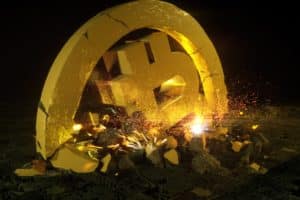The Securities and Exchange Commission (SEC) is at it again. This time to crack down on a crypto mining company called Green United, which allegedly set up a fraudulent scheme for its exclusive benefit.
Crypto scams: the SEC vs Green United LLC
Unfortunately, cases of scams and Ponzi schemes are not uncommon in the cryptosphere. Indeed, fraudsters do not hesitate a second to exploit crypto-investors’ enthusiasm for this novelty-rich industry.
As anticipated, this time, the Securities and Exchange Commission (SEC) is investigating Green United for an $18 million scam through a Ponzi scheme.
Green United LLC, based in Utah (US), claimed to revolutionize the cryptocurrency market by creating a decentralized global public power grid. And watch out, the company also promised to launch its own green blockchain and its own totally green token.
It also promised “Green Nodes” and “Green Boxes” (green mining devices). All in all, a totally 100% green program. Since then, reality has caught up with its promises.
According to the Securities and Exchange Commission (SEC), it would not be a pleasant sight. Indeed, the US financial cop has filed a complaint against Green United before the US District Court for the District of Utah, specifically on 3 March 2023.
The SEC accuses the alleged crypto project of devising a “fraudulent scheme” to the detriment of its customers.
In fact, the “Green Boxes” which were sold to investors, were not intended to mine green tokens, as the company claimed, but allowed them to purchase mining devices for Bitcoin (BTC).
According to the complaint, Green United raised more than $18 million between April 2018 and December 2022 for its so-called products.
The SEC’s contributed description of the crypto scam
The SEC then describes in detail how this fraudulent scheme works, stating:
“The Green Boxes and Green Nodes purchased by investors have not mined the green tokens. This is because green, an ERC-20 token on Ethereum, was not a minable crypto-asset, and the “green blockchain” promoted by the defendants did not exist.”
In fact, it appears that the green tokens were not created until several months after the initial offering and sale of the green boxes to investors. According to the SEC statement, in order to create the appearance of a successful mining operation, starting in 2019, Green United periodically distributed green tokens to investors’ wallets.
And contrary to what was claimed at the time, green tokens had no real value because they were not traded on a secondary market. Hence, with the money raised for the so-called green boxes, Antminer S9 devices were actually purchased.
Such ASIC machines are devices for Bitcoin mining. Unfortunately, this is more than common in this area of crypto mining. Obviously, investors have never received these precious Bitcoin.
Instead, they received green tokens with a very virtual value. At the same time, with promises of returns of up to 50% per month, there was reason to be wary of all these “green” promises.
Even Alameda Research, founded by Sam Bankman-Fried, promised “high returns without risk.” We have all seen, in November 2022, toward what catastrophic explosion all these ambitious wishes have led.
The other Ponzi scheme under the SEC’s crosshairs: BKCoin
According to the SEC, BKCoin sold cryptocurrencies to investors under the guise of financing the development of its cryptocurrency exchange platform. However, the SEC says the company never launched a platform and never complied with regulations in the United States.
Worse, the funds were allegedly misappropriated for personal purposes. According to the regulator’s complaint against BKCoin and its founder Kevin Kang in the US District Court for the Southern District of Florida, the company also allegedly exaggerated the number of users and transactions conducted on its platform.
A total of $100 million was allegedly stolen. Freezing of assets, seizure and emergency measures: the regulator does not mince words against BKCoin. Indeed, the SEC stated on the matter:
“From October 2018 to September 2022, BKCoin raised about $100 million from at least 55 investors to invest in cryptocurrencies, but BKCoin and Kang instead used some of the money to make Ponzi payments and for personal use.”
In detail, the SEC reports a deplorable situation in which the funds are being sent. Of the $100 million raised, $3.6 million would have been used to maintain the pyramid and pay returns to early investors.
The rest would have been spent on a luxurious life for Kang’s benefit, the complaint states:
“As the complaint alleges, the defendants ignored the structure of the funds, mixed the assets of investors, and used more than $3.6 million to make Ponzi-like payments to fund investors. The lawsuit also alleges that Kang embezzled at least $371,000 of investor money to, among other things, pay for vacations, sporting event tickets and an apartment in New York City.”


